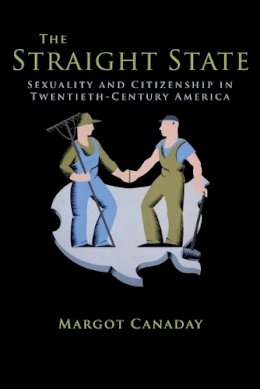28%OFF

Stock image for illustration purposes only - book cover, edition or condition may vary.
The Straight State: Sexuality and Citizenship in Twentieth-Century America
Margot Canaday
€ 30.99
€ 22.42
FREE Delivery in Ireland
Description for The Straight State: Sexuality and Citizenship in Twentieth-Century America
Paperback. Shows how the state systematically came to penalize homosexuality, giving rise to a regime of second-class citizenship that sexual minorities still live under today. This title looks at three key arenas of government control - immigration, the military, and welfare. Series: Politics and Society in Modern America. Num Pages: 296 pages, 6 halftones. BIC Classification: 1KBB; HBLW; JFSK; JPVH1; JWT. Category: (P) Professional & Vocational; (U) Tertiary Education (US: College). Dimension: 233 x 156 x 18. Weight in Grams: 428.
The Straight State is the most expansive study of the federal regulation of homosexuality yet written. Unearthing startling new evidence from the National Archives, Margot Canaday shows how the state systematically came to penalize homosexuality, giving rise to a regime of second-class citizenship that sexual minorities still live under today. Canaday looks at three key arenas of government control--immigration, the military, and welfare--and demonstrates how federal enforcement of sexual norms emerged with the rise of the modern bureaucratic state. She begins at the turn of the twentieth century when the state first stumbled upon evidence of sex and gender nonconformity, ... Read more
The Straight State is the most expansive study of the federal regulation of homosexuality yet written. Unearthing startling new evidence from the National Archives, Margot Canaday shows how the state systematically came to penalize homosexuality, giving rise to a regime of second-class citizenship that sexual minorities still live under today. Canaday looks at three key arenas of government control--immigration, the military, and welfare--and demonstrates how federal enforcement of sexual norms emerged with the rise of the modern bureaucratic state. She begins at the turn of the twentieth century when the state first stumbled upon evidence of sex and gender nonconformity, ... Read more
Product Details
Format
Paperback
Publication date
2011
Publisher
Princeton University Press United States
Number of pages
296
Condition
New
Series
Politics and Society in Modern America
Number of Pages
296
Place of Publication
New Jersey, United States
ISBN
9780691149936
SKU
V9780691149936
Shipping Time
Usually ships in 7 to 11 working days
Ref
99-1
About Margot Canaday
Margot Canaday is assistant professor of history at Princeton University.
Reviews for The Straight State: Sexuality and Citizenship in Twentieth-Century America
Winner of the 2012 Biennial Book Award, Order of the Coif Winner of the 2011 John Boswell Prize, Committee on Lesbian, Gay, Bisexual, and Transgender History Winner of the 2010 Ellis W. Hawley Prize, Organization of American Historians Winner of the 2010 Lambda Literary Award, LGBT Studies by the Lambda Literary Foundation Co-Winner of the 2010 Gladys M. Kammerer Award, ... Read more
